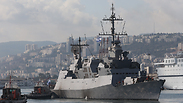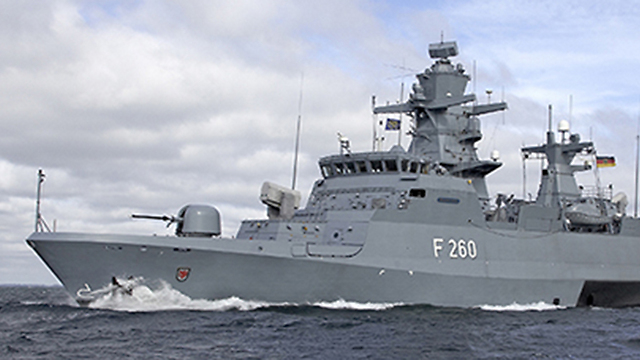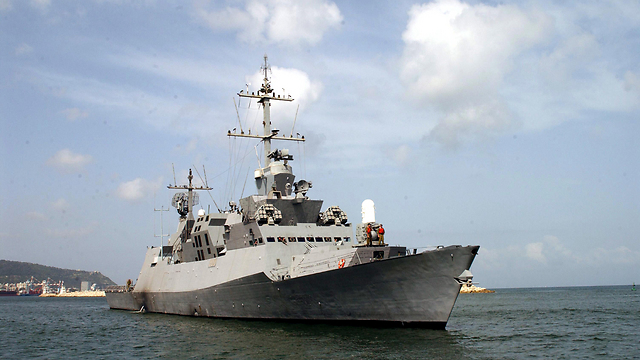
Sailing after the money
Analysis: Did Israel allow Germany to sell advanced submarines to Egypt in return for a discount on patrol boats to protect the natural gas rigs, which are both too big and too expensive?
One of the more curious and perhaps more serious aspects of the submarine affair is the Israeli approval given to Germany to sell advanced submarines to Egypt as well. This approval shocked past and present defense officials, because for many years Israel has decisively opposed deals that would allow Egypt to obtain advanced weapons systems similar to those Israel was procuring.
To ensure its qualitative edge remains, Israel includes a clause in every agreement it makes with a foreign government barring the seller from selling the same weapons to other countries in the Middle East.
Despite that, in 2013 the defense establishment learned Germany had signed an agreement to sell Egypt four Type 209 submarines, which were built by German conglomerate ThyssenKrupp and are similar to the ones Israel bought.
But there was more than one deal. In 2009, when Hosni Mubarak was still in power, the Egyptians sought to purchase two submarines from ThyssenKrupp, the very same shipyard that sold Israel its submarines.
Then-defense minister Ehud Barak and Prime Minister Benjamin Netanyahu acceded to the request from Cairo under the condition the submarines sold to Egypt would be less advanced than those sold to Israel.
Following Mubarak's ouster in 2011 and the rise to power of the Muslim Brotherhood and Mohamed Morsi, Netanyahu and Barak asked Germany to cancel the deal. The Germans said they could not withdraw from their agreement with Cairo at that point, and the submarines were delivered to Egypt in 2016.
In the second half of 2014, after the rise to power of Abdel Fattah al-Sisi, who had better ties with Israel, the Egyptians sought to buy four submarines of the more advanced models, as well as two anti-submarine ships.
The Israeli defense minister at the time, Moshe Ya'alon, and the heads of the relevant departments in the defense establishment, were not included in the discussions about the Egyptian request.
At that time, Egypt launched an accelerated process to build up its navel power in a scope and quality that did not match its economic abilities or its objective strategic needs. In recent years, the Egyptians purchased two aircraft carriers and advanced frigates and they are about to put the finishing touches on one of the largest modern fleets in the area.
The new submarine deal between Germany and Egypt was only discovered by the Defense Ministry by chance, and it caught Israel's top security officials by surprise. When Ya'alon asked Netanyahu about an Israeli approval to the deal, Netanyahu denied it.
In May 2015, the Defense Ministry sent an Israeli official, who was on his way to Germany, to make inquiries on the matter.
The Israeli official met with a senior German official in Berlin. When he asked why the Germans were selling submarines to Egypt in breach of their contract with Israel, the shocked German official presented him with documents showing an Israeli official had approved the sale to Egypt.
The Germans claimed these new agreements were made during their meeting with Netanyahu's representative, attorney Yitzhak Molcho. Molcho is a partner and relative of attorney David Shimron, who is a main suspect in the police investigation into the sale of the submarines to Israel.
Follow the money
In late 2014, at the same time the Germans and Egyptians were formulating their deal, the German government announced it was willing to subsidize a deal with Israel that would include the sale of four ships to protect Israel's natural gas rigs. The subsidy amounted to about a third of the deal—127 million euros.
The condition: The Israeli Defense Ministry would have to cancel the international tender it issued for the ships and award the contract to ThyssenKrupp, without a bid.
As Yedioth Ahronoth reported on Monday, three South Korean shipyards were supposed to compete in the original tender, as ThyssenKrupp's ships were too big (1,800 tons) and too expensive, and Israel only needed 1,200 ton ships.
But thanks to the German subsidizing, ThyssenKrupp was awarded the contract and the South Korean bid was canceled. The Navy, meanwhile, supported the deal as it was all too happy to get a frigate twice the size of the most advanced missile boat it currently has—the Sa'ar 5-class corvette.
But despite the German discount, the ships are still far more expensive than originally planned. The former head of the Defense Ministry's Directorate of Production and Procurement, Shmuel Zucker, learned this week the Navy went over the budget it was allocated by the Treasury, and the maintenance of the ships will be far more expensive compare to the smaller, Korean ships.
One should not rule out the possibility there is a connection between the change in the German position on selling subsidized ships to the Israeli Navy and the approval by Israel of ThyssenKrupp's deal with Egypt, from which the German shipyard made over 2 billion euros.
The three-way deal
Israel allows Germany to sell advanced submarines to Egypt, and in return it receives a considerable discount on the patrol boats deal. This way everyone—except, perhaps, state security—gains: The Germans, who get fat contracts with both Egypt and Israel, the Israeli representatives who work for the German shipyards and get their due reward, and even the Navy, which is getting bigger and more expensive ships (that serve no real need).Police investigators will have to question ThyssenKrupp's representative in Israel, Miki Ganor—who is in talks to become a state witness—whether there was a connection between the unprecedented strategic decision to allow the sale of advanced submarines to Egypt (unlike the far inferior submarines approved in the first deal) and the decision to purchase ships from the same German shipyard.
Furthermore, Ganor will have to answer whether the German commitment to subsidize the patrol vessels was given in return for Israel's approval to Berlin to sell advanced submarines to Egypt.












